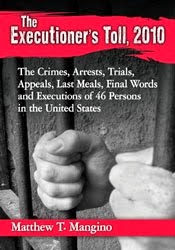The 1st Execution of 2024
Smith appeared to remain conscious for several minutes. For at least two minutes, he appeared to shake and writhe on the gurney, sometimes pulling against the restraints.
Alabama executed a convicted murderer with nitrogen gas on January 25, 2024, the first execution of 2024. The state put him to death with a
first-of-its-kind method that once again placed the U.S. at the forefront of
the debate over capital punishment, reported The Associated Press. The state said the method would be humane,
but critics called it cruel and experimental.
Officials said Kenneth Eugene Smith, 58, was
pronounced dead at 8:25 p.m. at an Alabama prison after breathing pure nitrogen
gas through a face mask to cause oxygen deprivation. It marked the first time
that a new execution method has been used in the United States since lethal
injection, now the most commonly used method, was introduced in 1982.
The execution took about 22 minutes from the time
between the opening and closing of the curtains to the viewing room. Smith
appeared to remain conscious for several minutes. For at least two minutes, he
appeared to shake and writhe on the gurney, sometimes pulling against the
restraints. That was followed by several minutes of heavy breathing, until
breathing was no longer perceptible.
In a final statement, Smith said, “Tonight Alabama
causes humanity to take a step backwards. ... I’m leaving with love, peace and
light.”
He made the “I love you sign” with his hands toward
family members who were witnesses. “Thank you for supporting me. Love, love all
of you,” Smith said.
Alabama
Gov. Kay Ivey said the execution was justice for the murder-for-hire killing of
45-year-old Elizabeth Sennett in 1988.
“After more than 30 years and attempt after attempt
to game the system, Mr. Smith has answered for his horrendous crimes,” Ivey
said in a statement. “I pray that Elizabeth Sennett’s family can receive
closure after all these years dealing with that great loss.”
Mike Sennett, the victim’s son, said Thursday night
that Smith “had been incarcerated almost twice as long as I knew my mom.”
“Nothing
happened here today is going to bring Mom back. It’s kind of a bittersweet day.
We are not going to be jumping around, whooping and holler, hooray and all
that,” he said. “I’ll end by saying Elizabeth Dorlene Sennett got her justice
tonight.”
The state had previously attempted to execute Smith
in 2022, but the lethal injection was called off at the last minute because
authorities couldn’t connect an IV line.
The execution came after a last-minute legal battle
in which his attorneys contended the state was making him the test subject for
an experimental execution method that could violate the constitutional ban on
cruel and unusual punishment. Federal courts rejected Smith’s bid to block it,
with the latest ruling coming Thursday night from the U.S. Supreme Court.
Justice Sonia Sotomayor, who along with two other
liberal justices dissented, wrote, “Having failed to kill Smith on its first
attempt, Alabama has selected him as its ‘guinea pig’ to test a method of
execution never attempted before. The world is watching.”
The majority justices did not issue any statements.
The state had predicted the nitrogen gas would cause
unconsciousness within seconds and death within minutes. State Attorney General
Steve Marshall said late Thursday that nitrogen gas “was intended to be — and
has now proved to be — an effective and humane method of execution.”
Asked about Smith’s shaking and convulsing on the
gurney, Alabama corrections Commissioner John Q. Hamm said they appeared to be
involuntary movements.
“That was all
expected and was in the side effects that we’ve seen or researched on nitrogen
hypoxia,” Hamm said. “Nothing was out of the ordinary from what we were
expecting.”
Smith’s spiritual adviser, the Rev. Jeff Hood, said the execution
did not match the state attorney general’s prediction in court filings that
Smith would lose consciousness in seconds followed by death within minutes.
“We didn’t see somebody go unconscious in 30
seconds. What we saw was minutes of someone struggling for their life,” said
Hood, who attended the execution.
Some doctors and organizations had expressed alarm
about the method, and Smith’s attorneys asked the Supreme Court to halt the
execution to review claims that it violates the constitutional ban on cruel and
unusual punishment and deserved more legal scrutiny before it was used on a
person.
“There is little research regarding death by
nitrogen hypoxia. When the State is considering using a novel form of execution
that has never been attempted anywhere, the public has an interest in ensuring
the State has researched the method adequately and established procedures to
minimize the pain and suffering of the condemned person,” Smith’s attorneys
wrote.
In her dissent, Sotomayor said Alabama has shrouded
its execution protocol in secrecy, releasing only a heavily redacted version.
She added that Smith should have been allowed to obtain evidence about the
protocol and to proceed with his legal challenge.
“That information is important not only to Smith,
who has an extra reason to fear the gurney, but to anyone the State seeks to
execute after him using this novel method,” Sotomayor wrote.
“Twice now this Court has ignored Smith’s warning
that Alabama will subject him to an unconstitutional risk of pain,” Sotomayor
wrote. “I sincerely hope that he is not proven correct a second time.”
Justice Elena Kagan wrote a separate dissent and was
joined by Justice Ketanji Brown Jackson.
In his final hours, Smith met with family members
and his spiritual adviser, according to a prison spokesperson.
Smith ate a last meal of T-bone steak, hash browns,
toast and eggs slathered in A1 steak sauce, Hood said by telephone before the
execution was carried out.
“He’s terrified at the torture that could come. But
he’s also at peace. One of the things he told me is he is finally getting out,”
Hood said.
The execution protocol called for Smith to be strapped
to a gurney in the execution chamber — the same one where he was strapped down
for several hours during the lethal injection attempt — and a “full facepiece
supplied air respirator” to be placed over his face. After he had a chance to
make a final statement, the warden, from another room, was to activate the
nitrogen gas. It would be administered through the mask for at least 15 minutes
or “five minutes following a flatline indication on the EKG, whichever is
longer,” according to the state protocol.
Hamm, the
corrections commissioner, confirmed afterward that the gas was flowing for
about 15 minutes.
Sant’Egidio Community, a Vatican-affiliated Catholic
charity based in Rome, had urged Alabama not to go through with the execution, saying the method is
“barbarous” and “uncivilized” and would bring “indelible shame” to the state.
And experts appointed by the U.N. Human Rights Council cautioned they believe
the execution method could violate the prohibition on torture.
Some states are looking for new ways to execute people because the drugs used in
lethal injections have become difficult to find. Three states — Alabama, Mississippi
and Oklahoma — have authorized nitrogen hypoxia as an execution method, but no
state had attempted to use the untested method until now.
Smith’s attorneys had raised concerns that he could
choke to death on his own vomit as the nitrogen gas flows. The state made a
last-minute procedural change so he would not be allowed food in the eight
hours beforehand.
Sennett was found dead in her home March 18, 1988,
with eight stab wounds in the chest and one on each side of her neck. Smith was
one of two men convicted in the killing. The other, John Forrest Parker,
was executed in 2010.
Prosecutors said they were each paid $1,000 to kill
Sennett on behalf of her pastor husband, who was deeply in debt and wanted to
collect on insurance. The husband, Charles Sennett Sr., killed himself when the
investigation focused on him as a suspect, according to court documents.
Smith’s 1989 conviction was overturned, but he was
convicted again in 1996. The jury recommended a life sentence by 11-1, but a
judge overrode that and sentenced him to death. Alabama no longer allows a
judge to override a jury’s death penalty decision.
To read more CLICK HERE








